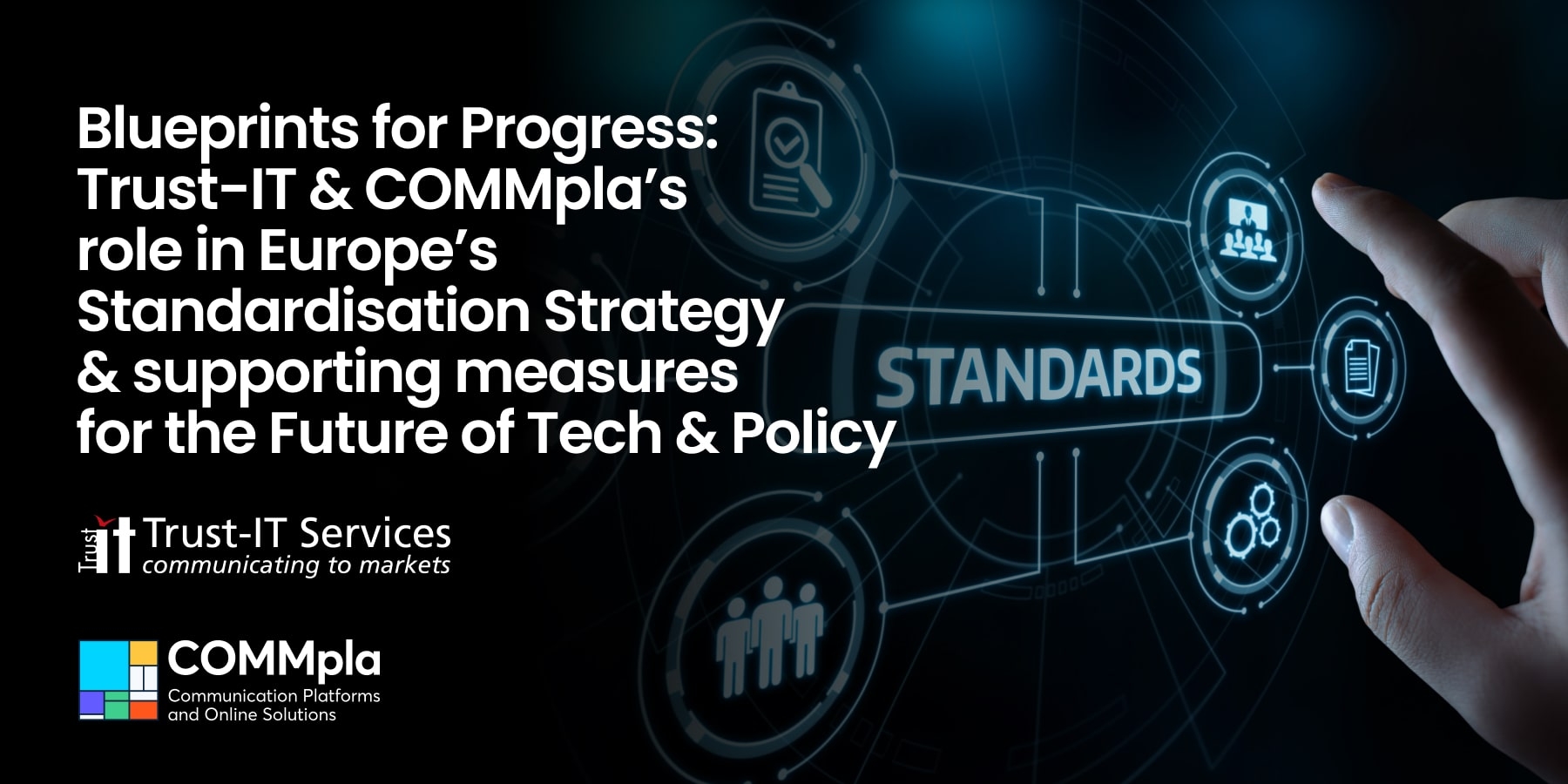Blueprints for Progress: Trust-IT & COMMpla’s role in Europe’s Standardisation Strategy & supporting measures for the Future of Tech & Policy

Standards act silently in the background of people’s day-to-day lives to lay the groundwork for the future of technological innovation, societal advancement, and environmental sustainability, ensuring that our progress is safe, efficient, and responsible. Standards have been a fundamental yet understated aspect of human societies for centuries. While they rarely feature in everyday discussions, their impact on enhancing the quality of life and ensuring safety is profound. Standards provide consistency and compatibility across various domains, from construction to digital communication. They are the invisible framework that supports and streamlines modern life. Standardised dimensions in building materials like bricks ensure structural integrity and safety. Medical standards guarantee best-practice measures to ensure proper treatment. In the digital realm, standardised protocols enable seamless internet connectivity across different devices and platforms. These examples underscore the essential role of standards in fostering efficiency and reliability in our daily lives. They may not be a frequent topic of conversation, but their ubiquitous influence is undeniable, quietly ensuring that our world functions smoothly and safely.
In today's rapidly evolving world, particularly in the realm of technology, staying updated with new standards is more important than ever. The European Commission’s Standardisation Strategy exemplifies its commitment to staying abreast of technological advancements and increasing global interconnectivity. Recognising the rapid technological advances and the increasing interconnectedness of global markets, the EU has proactively developed and adapted standards in emerging technological fields. This strategic approach ensures that new technologies are safe, interoperable, and environmentally sustainable. This will help enhance the EU’s technical competencies and ensure its standards align with global market dynamics, fostering international trade and cooperation. This proactive stance in standardisation also reflects the European dedication to driving innovation while maintaining consumer protection and market fairness.
Both Trust-IT Services & COMMpla have been playing a multifaceted role in this strategic vision, coordinating and participating in several standards-related pilot projects for the past eight years, contributing to the boosting of European competitiveness and resilience both throughout the European Union and globally.
Trust-ITCOMMpla’s contribution to the European standards began back in 2018 with the coordination pilot project StandICT.eu, the first of its kind to provide financial support to European experts working on ICT standards to bolster Europe's influence in the global Information and Communication Technologies (ICT) landscape. Such an effort entailed the creation of a dedicated open calls management platform, TRUST-GRANTSTM platform, to manage funding applications from ICT standardisation experts and support their activities in global SDOs. So far, the project has successfully allocated over €6 million to fund over 400 ICT standardisation experts through its fellowship programme. It is now in its third phase, StandICT.eu 2026, with Dublin City University (DCU), AUSTRALO, European Digital SME Alliance, Fraunhofer Institute, and OpenForum Europe, which began in August 2023 and completes in September 2026.
Concurrently, as part of the 5G Public-Private Partnership (5G PPP) initiative, the Trust-IT/COMMpla deployed its software development and strategic roadmapping expertise for the development of a Standards Tracker as part of the CSA project Global5G (2017-2019). The tool mapped and monitored ongoing studies and initiatives developed by 93 R&I projects throughout the whole course of 5G PPP (2014-2023), providing a comprehensive repository of evolving standards. Moreover, the tracker aided in identifying gaps, overlaps, and opportunities for harmonisation in standardisation efforts.
Recognising the success and utility of this approach, an improved standards tracker is being developed in the context of the SNS OPS project, coordinated by EURESCOM, funded under the Smart Networks and Services Joint Undertaking (SNS JU). The tool extends its scope to forthcoming 6G standards, contributing to maintaining Europe's competitive edge in telecommunications technology.
Building upon the experience acquired with open calls management, stakeholder engagement and standardisation roadmapping, in 2021, the Trust-IT/COMMpla team joined forces with DCU, the University of Belgrade, Dansk Standards and SGS to create HSbooster.eu, the first Horizon Standardisation Booster pilot. HSbooster.eu provides consultancy services that support R&I projects in integrating standardisation from the ground up, creating a nexus for experts from various fields. It also enhances proficiency in standardisation by offering specialised training materials. Significantly, its contributions have been recognised in the EU's Code of Practice for Standardisation, as referenced in the Commission Recommendation (EU) 2023/498, underlining the project's influence and importance in shaping standardisation practices. To date, the project has provided premium services to over 100 R&I projects in the broad research domains of sustainable digitalisation, green transition, health, resilience and circular economy.
The extensive experience with open call management, ICT standardisation, and expert recruitment was acquired during StandICT.eu and HSbooster.eu marked the inclusion of two additional projects allocating funding to standardisation and promoting European standards in key technological fields. The first project, SEEBLOCKS.eu, launched in November 2023, focuses on creating a framework for standards linked to blockchain and Distributed Ledger Technologies (DLT). Coordinated by Trust-IT and featuring DCU and the Fraunhofer Institute, SEEBLOCKS.eu contributes to integrating blockchain seamlessly into various European industries and sectors, allocating € 300,000 to about 30 DLT experts. Moreover, it has also created a Visualisation Tool, collecting relevant blockchain standardisation materials to help experts navigate this growing landscape.
On a more global note, between 2024 and 2026, the InDiCo-Global project, coordinated by ETSI, will allocate €1 million through the TRUST-GRANTS TM platform to experts working on the integration of global standards building bridges between technical communities and policymakers on topics relating to the Digital Single Market and the related ICT standardisation priorities (5G, IoT, Cloud, Big Data and Cybersecurity, Intelligent Transport Systems and Distributed Ledger Technologies). Such a project will foster awareness of the European Standardisation System globally and enhance cooperation with targeted non-EU countries such as Brazil, China, India, Japan, South Korea and the United States.
Just as importantly, and kicking off in January 2024, Trust-IT and COMMpla will deploy their knowledge of emerging standards, training modules and framework building on two more projects. First, in the INSTAR project, coordinated by BluSpecs, aiming at promoting and defining European standards and strategic partnerships worldwide with actors such as Sony and Toyota, They will contribute to creating high-level standardisation frameworks, activate task forces, organise webinars and workshops and deliver reports on agreements on common standards and roadmaps. Secondly, the Edu4Standards.eu project, coordinated by the Fraunhofer Institute, will pick up the baton from the StandICT.eu and HSbooster.eu experiences to create an academy led by a pool of knowledgeable experts in European standardisation to train the next generations of standardisation experts coming from Higher Education Institutions (HEIs).
Finally, 2024 will also see the Trust-IT and COMMpla’s efforts concentrated on the Cyber Resilience Act, with the CRA going through the final phases in the European Parliament with the harmonisation of standards. In this context, new standards-related activities are envisioned, drawing from the know-how accumulated over the last years.
The pivotal role of the European Union's Standardisation Strategy cannot be overstated, as it anchors the continent's competitive position in an era marked by rapid technological change. The strategy's success is embodied in its five fundamental pillars, which are actively pursued through transformative projects in ICT, blockchain, education and telecommunications sectors. Our organisations are proud to play such an instrumental role in the aforementioned projects, which are essential for fostering innovation, safety, and interoperability, ensuring the EU's standing in the global market. The EU's dedication to these standardisation initiatives signals its recognition of its critical role in enabling a unified, technologically advanced, and environmentally mindful future.
Interested in standardisation in the EU context?

